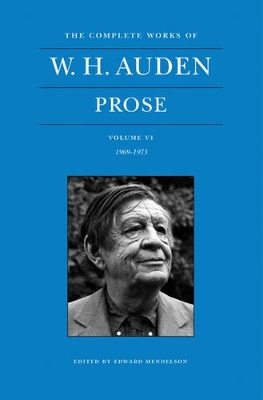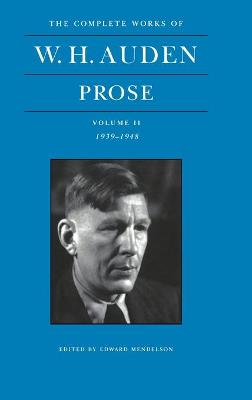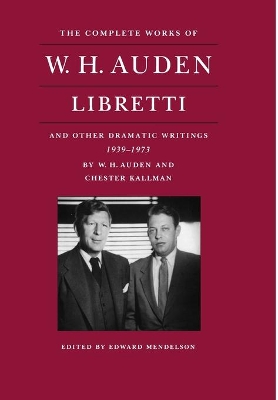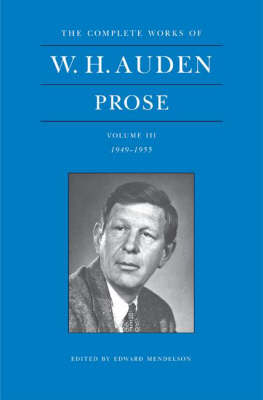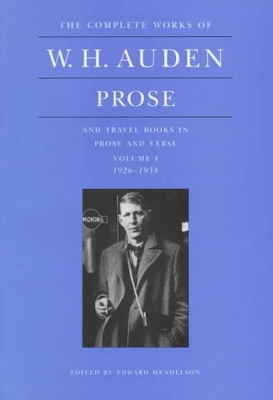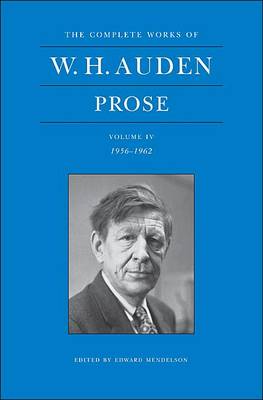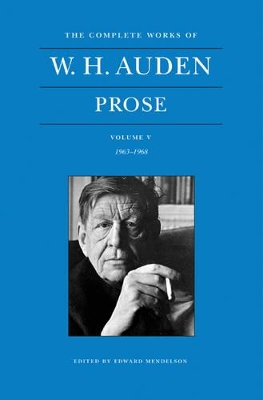The Complete Works of W.H. Auden
8 total works
Also included will be introductions placing the works in the context of literary traditions and relating them to Auden's life and times. As planned, the first volume of the series contains plays and other drama, and the second volume will include the libretti. The essays and reviews will appear in the third, fourth, fifth, and sixth volumes, and the seventh and eighth volumes will contain the poems. "Plays and Other Dramatic Writings, 1928-1938" - this volume contains Auden and Christopher Isherwood's dramatic extravaganzas. "The Dog Beneath the Skin", "The Ascent of F 6", and "On the Frontier". It also includes the two versions of "Paid on Both Sides" - which are so different as to constitute two works - and Auden's satiric revue, "The Dance of Death". Two plays appear in print for the first time, Auden and Isherwood's "The Enemies of a Bishop" and "Auden's The Chase". Also included are Auden's prose and verse written for documentary films, a cabaret sketch, and an unpublished radio script. Many of the texts include poems by the young Auden that have never been published before.
The extensive historical and textual notes trace the complex history of the production and revision of these plays, including full texts of rewritten scenes. During the years when these works were created, Auden moved from a "poetry of isolation" to more expansive and public writing. After he left Oxford at age twenty-one, during the summer of 1928, he wrote the tragicomic charade Paid on Both Sides. During the next ten years, until he left England for America, he created the increasingly ambitious works for stage, film, and broadcast that appear in this volume. The most important of these plays were written in collaboration with Isherwood. As the world political situation worsened, Isherwood and Auden's style combined the energy of popular entertainment with the urgency of sacramental ritual.
Other highlights include writings on opera and poetry as well as reports of Auden's lectures and the text of an unfinished autobiographical book, The Prolific and the Devourer. Throughout, Edward Mendelson's extensive and illuminating editor's notes explain all contemporary and private allusions. By making available a large cache of important but previously difficult-to-obtain writings on key subjects, this volume will be of obvious appeal to Auden's legions of admirers. It will also be enjoyed by everyone interested in twentieth-century literature, religion, and culture.
It also includes Auden and Kallman's The Rake's Progress, written for Igor Stravinsky, and Delia, written for Stravinsky but never set to music. The book continues with Auden and Kallman's two libretti written for music by Hans Werner Henze, Elegy for Young Lovers and The Bassarids, and their adaptation of Love's Labour's Lost, composed by Nicolas Nabokov. It also contains their translation of The Magic Flute, with its scenes reordered for greater dramatic coherence and added dialogue for sharper mythical significance, and their antimasque, The Entertainment of the Senses, for music by John Gardner. The book contains two radio plays--The Dark Valley, a monologue written by Auden alone, and The Rocking Horse Winner, written with James Stern and based on a story by D. H. Lawrence.
Also included are the unpublished masque that Auden wrote for Kallman's twenty-second birthday, the unpublished versions of The Dutchess of Malfi that Auden prepared with Bertolt Brecht, scenarios for a film script and a libretto that were never completed, Auden's narrative for the medieval Play of Daniel, two narratives for documentary films, and his song lyrics written for Man of La Mancha before the producer decided to use a different lyricist.
Auden writes about the imaginary mirrors that everyone carries through life; French existentialism and New Yorker cartoons; Freud, Kierkegaard, Dostoyevsky, and Camus; Keats, Cervantes, Melville, Colette, Byron, Virgil, Yeats, Tolkien, and Virginia Woolf; opera, ballet, cinema, prosody, and music; English and American poetry and society; and politics and religion. The introduction by Edward Mendelson places the essays in biographical and historical context, and the extensive textual notes explain obscure contemporary references and provide an often-amusing history of Auden's work as an editor of anthologies and a series of books by younger poets.
Auden--the first published book by a man who was to become the dominant literary figure of his generation and one of the century's greatest poets. Sixty years later, Princeton University Press inaugurated an edition of the complete works of Auden, which is intended to serve as the definitive text for all the works Auden published or intended to publish in the form in which he expected to see them printed: his plays and other drama, libretti, essays and reviews, and poems. The Complete Works of W. H. Auden will provide a unique opportunity to solve the numerous textual problems connected with the severe revisions Auden made in his own works. The texts are newly edited from Auden's manuscripts by Edward Mendelson, the literary executor of the Auden estate.
